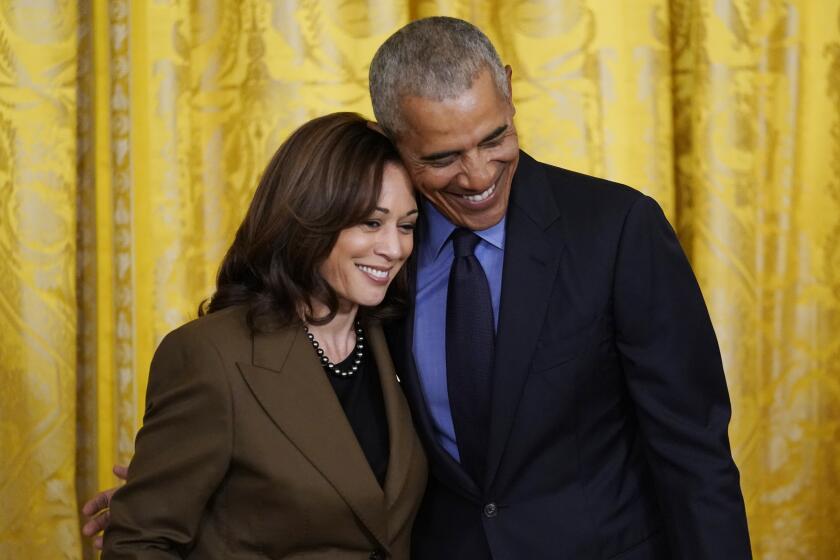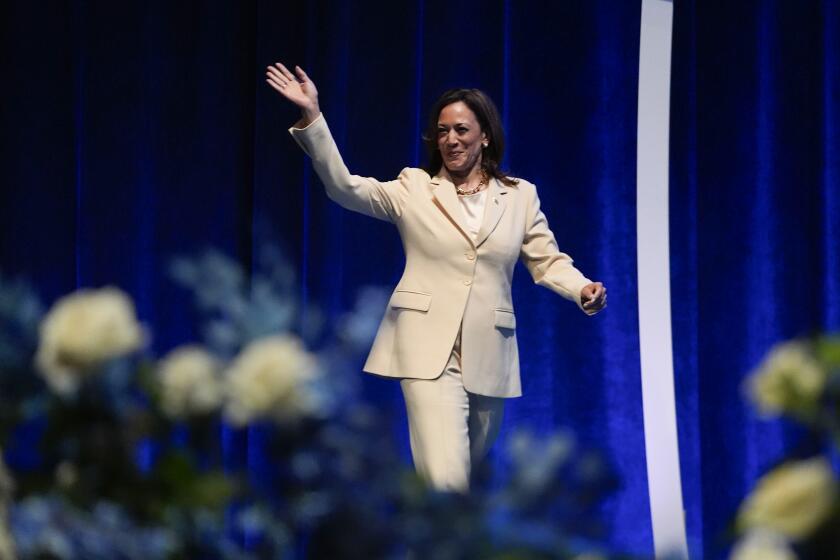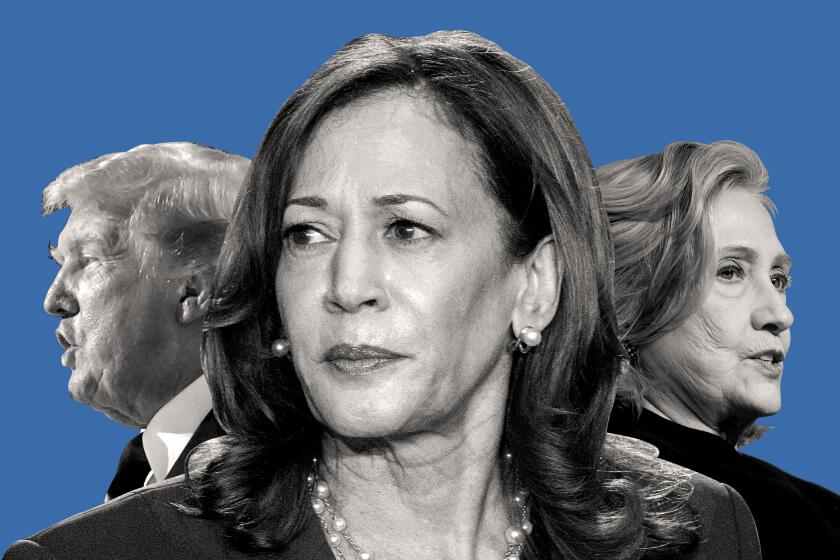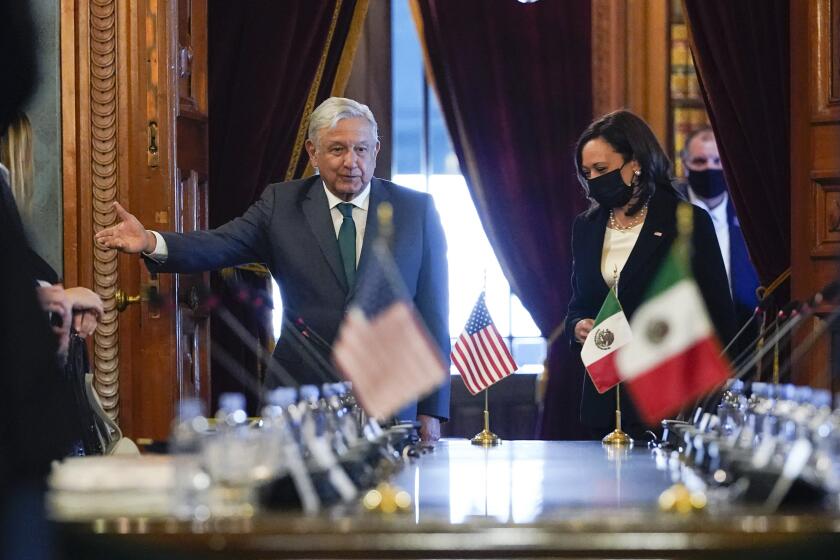Harris mobilizes grassroots activists, sorority sisters. But not all Black women are on board
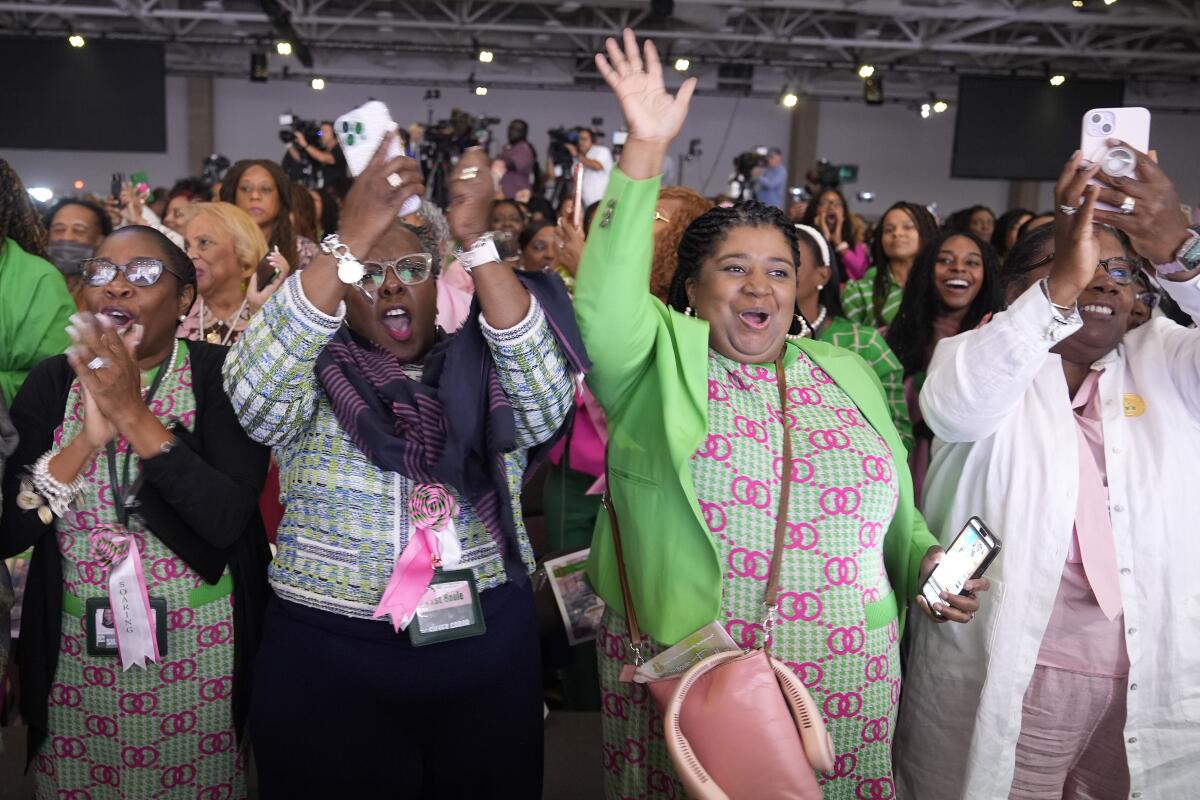
ATLANTA — Black women have long been celebrated as the Democratic Party’s most loyal and steadfast voting bloc. Even so, their votes can’t be taken for granted, and if you want to understand the opportunities and challenges Kamala Harris faces in her run for the White House, consider two Black women: Robyn Donaldson and Shaquita Jones.
Donaldson embodies the energy and hope many Black women felt when President Biden announced he would not seek reelection and endorsed Harris to lead the Democratic ticket. When she heard the news, she screamed and ran around her mom’s house in Chicago.
A stream of Black women — including California Rep. Maxine Waters and Beyoncé’s mom — rushed to endorse Harris. “Ahahahaha lets gooooo,” rapper Cardi B posted on X.
Though Obama was initially noncommittal after Biden said he would not seek reelection, the Obamas’ nod is unsurprising given their long relationship with Harris.
But some, like Jones, are less certain. “I don’t know much about her,” said Jones, a 35-year-old manager of a Krispy Kreme in Atlanta’s historically Black West End neighborhood. “I’ll have to do research.”
Donaldson, a grassroots organizer who has spent two decades mobilizing volunteers to get out the vote for Democrats, has no such qualms.
Though she had still planned to vote for Biden and had campaigned for him in 2020, the 40-something trauma-informed yoga teacher felt let down, she said, after he failed to deliver on voting rights. This year she decided she would vote early by mail and then not do “a darn thing.”
But when Biden endorsed Harris on July 21, she got to work, plotting with other Black women to mobilize a rush of new volunteers to donate, staff phone banks, knock on doors, serve as poll workers or precinct captains.
“I am all in for VP Harris,” she said. “The energy and excitement has gone from zero to 1,000!”
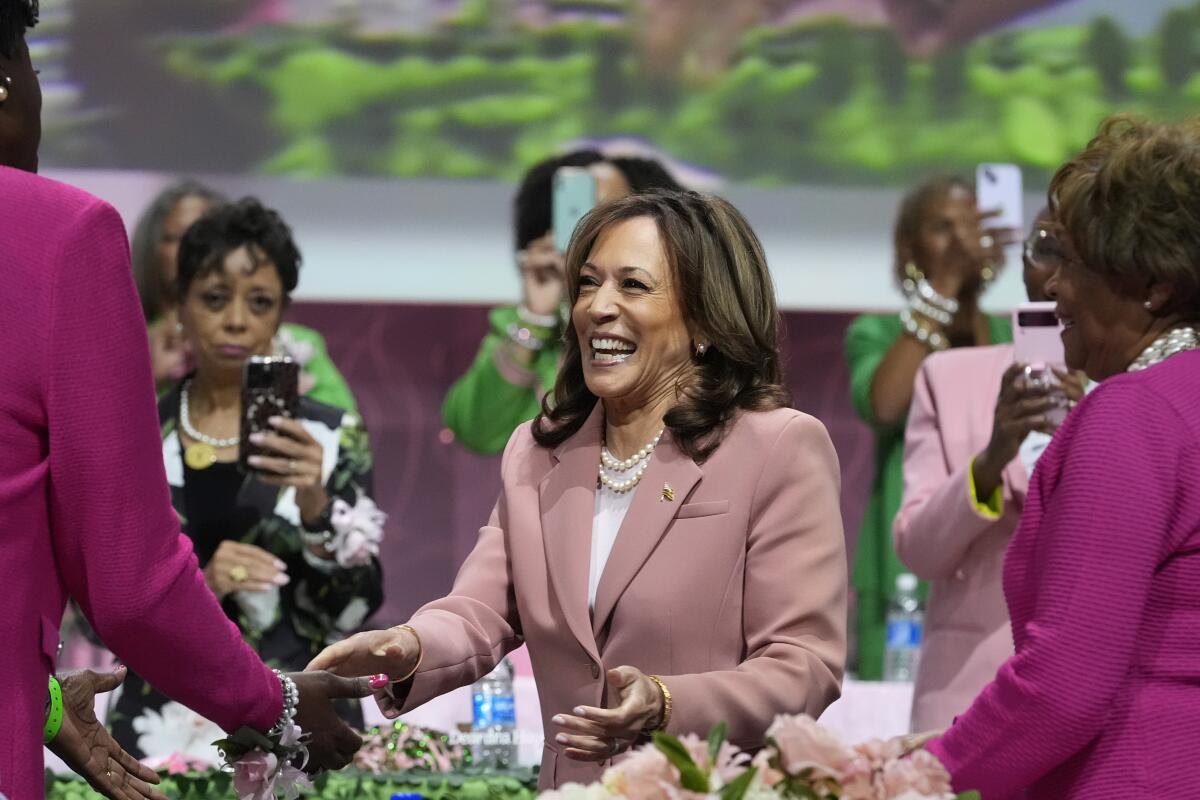
Jones also voted for Biden in 2020, but had decided she would not vote for him again.
The Biden administration, Jones said, had done little to improve her life. Her monthly rent had climbed from $875 to $1,600 over the last four years. Her pay — $20 an hour — hadn’t changed.
“Everybody’s struggling financially,” she said.
Jones said she hoped Harris might offer something different than Biden and Trump and help Black Americans a bit more. But support Harris? She still wasn’t sure.
In 2020, more than 90% of Black women voters supported the Biden-Harris ticket. In the swing state of Georgia, Black women played a pivotal role in flipping the red state blue — registering college students to vote and campaigning, sometimes by waving signs on street corners.
But Biden’s victory here was slim — he won by just 11,779 votes — and recent polls showed him down 5.9 points against former President Trump.
While the prospect of Harris as president has inspired many Black professionals, activists and sorority sisters to volunteer, donate and share memes of the VP as Wonder Woman, the mood is more tepid among some blue-collar workers like Jones — women struggling with rising rents and grocery prices.
With school starting next month, the single mother of two said she had a more pressing question than who to vote for: “Am I going to pay my bills or am I gonna get my son some new uniforms?”
An analysis of interviews with women voters published this month by KFF found that 14% of Black women who voted for Biden in 2020 said they did not plan to vote in the 2024 presidential race — and 8% said they would vote for Trump.
Fewer than half of Black women voters aged 18 to 49 said they were “absolutely certain” they would vote.
Get the L.A. Times Politics newsletter
Deeply reported insights into legislation, politics and policy from Sacramento, Washington and beyond. In your inbox three times per week.
You may occasionally receive promotional content from the Los Angeles Times.
About 53% of Black women voters in KFF’s surveys said inflation and the rising cost of household expenses was the most important issue. Only 12% of Black women voters identified abortion and 18% identified threats to democracy as key problems.
Even so, Harris certainly has enthused key members of the Democratic base.
The day Biden endorsed Harris, more than 44,000 Black women and allies from across the country logged into Zoom for an event organized by Win With Black Women, a collective of intergenerational Black women. Organizers said they raised more than $1.5 million in three hours.
Kerry L. Haynie, a professor of political science at Duke University, said the prospect of Harris’ candidacy had generated “buzz” the Democratic Party hadn’t felt since Barack Obama ran for president in 2008.
After Biden withdrew from the race, Haynie fielded a call from his 85-year-old mother: “Can you believe it’s going to be a Black woman nominee?”
Then, his 22-year-old daughter, who had not been enthusiastic about Biden, called: “Have you seen the news?” She thought it was a great move.
Harris’ rise appears to be enthusing even grassroots activists who came out in force in the last few weeks to defend Biden.
On July 13, LaTosha Brown, a co-founder of Black Voters Matter, condemned “the hyperbolic, coordinated and well-funded dissent” led by white politicians, pundits and donors to push Biden out of the race. She said a Biden withdrawal would be a “risky and ill-prepared move that can further splinter the vote and add confusion to the process for voters.”
But on July 21, Brown was startled when one of her older cousins ran into the room at a family reunion in Norcross, Ga., to announce Biden had dropped out and endorsed Harris.
Some relatives cheered. “Oh God!” one shouted. “We can win!”
Over the next 24 hours, Brown’s phone lit up with calls and texts — not just from the usual grassroots organizers, but from friends who rarely or never volunteered.
After logging onto the Win With Black Women Zoom, Brown was too excited to sleep. Her phone kept beeping as she tried to lie down, so she wound up holding an impromptu meeting with activists, staying up past 3:30 a.m. to discuss the possibilities of Harris as president.
“This is just what we needed,” she said. “It feels a clear path to victory.”
Speaking at a convention of Black sorority sisters as the likely Democratic nominee for president, Vice President Kamala Harris ramps up her call to mobilize voters.
Some Black women worry that their fellow Americans are not ready to elect a Black woman president to the nation’s highest office. Many expect Trump, who mocked and undermined Clinton in 2016 for playing “the woman’s card,” to lob sexist attacks against Harris.
But eight years after the race with Clinton, Brown argued, a misogynist playbook wouldn’t work so well. Women, she said, were activated after the Supreme Court overturned Roe vs. Wade.
“My grandmother had this saying: ‘What the devil means for harm, God will use for your good,’” Brown said. “What Trump often does is he tries to berate women and demean their character.... Her gender, he may see as a burden, but I actually think it’s a blessing. If America ever needed a woman to helm the ship, it would be now.”
Still, some Black women resist appeals to support Harris just because she’s a Black woman.
Joi Jenkins, a food prep worker at an Atlanta juice bar, said she voted for Biden in 2020, hoping that, with Harris behind him, he would represent not just the common man, but the most needy. She said she wouldn’t make that same mistake again.
“Her being a Black woman doesn’t give her an allegiance to me as a person,” Jenkins said.
The Biden years had been rough for Jenkins: In 2021, she lost her home and her health consulting business and was forced to send her children to live with her ex-husband. After a long period of couch-surfing and sleeping outside in her truck, the 44-year-old had a job that paid $13 an hour, but she was struggling to pay $370 a week hopping from Airbnb to Airbnb.
Dueling narratives on Kamala Harris reflect a unique election: She’s poised to be the first woman of color to top a major-party ticket, and Trump is the first convicted felon to do so.
Jenkins said she thought Harris had been used by Biden.
“I don’t know that if push came to shove, I would want her to be leading the country,” Jenkins said. “Honestly, I don’t think she’s capable.”
Instead, Jenkins said she was leaning toward voting for “that ridiculous orange human.”
Harris also has a challenge in bringing on board young left-wing voters who are disillusioned with the Biden-Harris administration’s staunch support for Israel’s war against Hamas in Gaza and are skeptical of her record as a tough-on-crime California prosecutor.
Brionte McCorkle, 32, the executive director of Georgia Conservation Voters, said she had long been wary of Harris because of her record as a prosecutor. In 2020, she supported Bernie Sanders over Harris.
“The criminal justice thing, locking Black people up for marijuana, that’s such a big part of the prison pipeline,” McCorkle said. “I really didn’t care for that kind of law-and-order candidate approach.”
Kamala Harris struggled to find her political footing in her early years as vice president. Her allies say that has changed since Roe vs. Wade was overturned.
But not voting was not an option. McCorkle learned her lesson in 2016 when she decided not to vote for Clinton — “I literally thought at the time, ‘How bad can it be?’” — and watched the country descend into “absolute chaos” as Trump dismantled government programs and rolled back environmental protection.
But that was then. Today, it didn’t feel so stressful — as if she were carrying water — to urge people to vote for Harris.
“Is she a perfect candidate?” McCorkle said. “No. Is she far better than Trump and Biden? Absolutely.”
More to Read
Get the L.A. Times Politics newsletter
Deeply reported insights into legislation, politics and policy from Sacramento, Washington and beyond. In your inbox three times per week.
You may occasionally receive promotional content from the Los Angeles Times.
